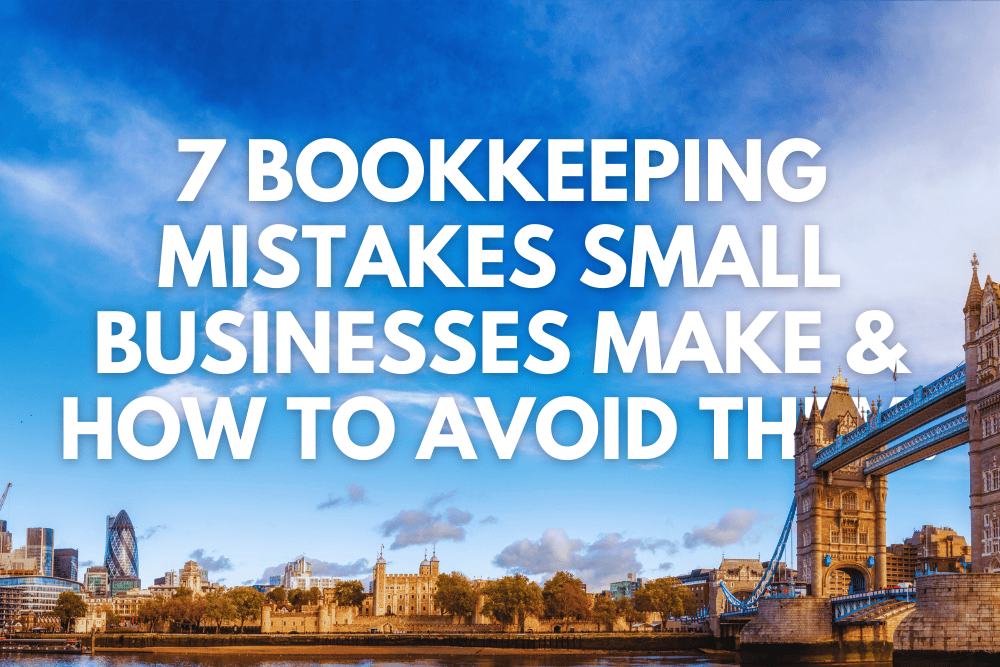
The Top 7 Bookkeeping Mistakes Small Businesses Make and How to Avoid Them.
Good bookkeeping is the backbone of every successful small business. Yet, many entrepreneurs and business owners unknowingly make accounting errors that can cost money, create stress, and even put the health of their business at risk.
At our firm, we see the same issues arise time and again. Here are the seven most common bookkeeping mistakes we encounter - and how to prevent them with a few simple habits (and a little expert support).
7 Bookkeeping Mistakes Small Businesses Make
1. Mixing Personal and Business Finances
One of the most common – and costly – mistakes is combining personal and business spending. It creates confusion, makes reporting harder and can distort how your business is truly performing.
How to Avoid It:
Open a dedicated business bank account and use business-only cards for all transactions. This keeps your finances separate, compliant and creates a clear record of activity which is easy to review.
2. Failing to Keep Receipts and Records
Losing receipts or failing to store records properly might seem minor, but it can cause significant problems later. Missing records can delay VAT return submissions, lead to missed opportunities to reclaim VAT and reduce the accuracy of your management accounts.
How to Avoid It:
Scan and store receipts as soon as you receive them using data capture tools such as Dext. This ensures we have all we need to maintain accurate bookkeeping and prepare your accounts efficiently.
3. Not Reconciling Bank Statements Regularly
Bank reconciliation means matching your invoices and bills with your bank transactions. Errors and omissions may go undetected if this isn't completed on a regular basis, resulting in inaccurate reports and records.
How to Avoid It:
Establish a weekly or monthly bank account reconciliation process. Regular reconciliations help us produce accurate management accounts and VAT returns, and keep your records reliable.
4. Improperly Categorising Expenses
Categorising expenses incorrectly can skew financial reporting and make tax planning more complicated.
How to Avoid It:
Use modern bookkeeping software such as Xero, which can automate much of the categorisation process. This keeps your bookkeeping accurate and ensures your management accounts and VAT reports are generated accurately and on time.
5. Neglecting Accounts Receivable and Payable
Letting unpaid invoices pile up or delaying bill payments can hurt your cash flow and damage supplier relationships.
How to Avoid It:
Modern bookkeeping software like Xero can automate much of this process with payment reminders and chaser emails, to help you stay on top of both incoming and outgoing payments.
6. DIY Bookkeeping Without the Right Knowledge
Many small business owners take on bookkeeping themselves to save money. Unfortunately, small errors can quickly grow into costly problems.
How to Avoid It:
Invest time in learning basic bookkeeping principles – or let our team manage it for you. We can manage your bookkeeping, VAT returns, and management accounts accurately, freeing you up to focus on growing your business.
7. Ignoring Financial Reports
If you’re not regularly reviewing your financial reports - such as cash flow, balance sheet, and profit & loss - you’re missing key insights into how your business is performing. Without that visibility, it’s difficult to plan ahead or make informed decisions.
How to Avoid It:
Review your financial reports monthly. Our team can prepare these reports for you and walk you through the numbers, helping you identify trends and make smarter decisions for your business.
How We Can Help
Avoiding these common bookkeeping mistakes doesn’t just keep you compliant - it gives you the clarity and confidence to make better business decisions.
If you’d like to streamline your bookkeeping or get support with VAT and management accounts, our team would be happy to help. Contact us today!
Author, Apisana Anpukkarasan - Outsourced Finance
Apisana.Anpukkarasan@ArnoldHill.co.uk

